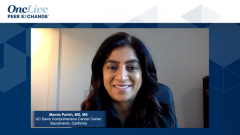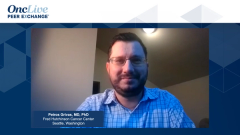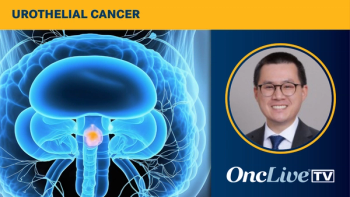
Clinical Trial Data With Perioperative Therapy in MIBC: The RETAIN BLADDER Study
Focused discussion on the RETAIN BLADDER study, which explored the option to avoid cystectomy in patients with good response to systemic therapy.
Episodes in this series

Transcript:
Shilpa Gupta, MD: We talked a lot about the neoadjuvant and adjuvant therapy unmet needs. I want to highlight some abstracts. I’ll ask Petros to walk us through what we saw at ASCO GU [American Society of Clinical Oncology Genitourinary Cancers Symposium] for the unmet needs in neoadjuvant and adjuvant therapy, as we saw with the RETAIN BLADDER study data. Could you walk us through that, Petros? And then there was the ... study and the ... study. These are all novel approaches looking at bladder preservation and other important patient-focused questions.
Petros Grivas, MD, PhD: I’ll do that in a concise fashion, but I will quickly I comment on nonmuscle-invasive disease. That’s how rapidly this field is evolving. We saw data for BCG [Bacillus Calmette-Guérin]–responsive nonmuscle invasive disease from Dr Andrea Necchi in the KEYNOTE-057 trial. Dr Necchi showed cohort B of the KEYNOTE-057 trial, looking specifically at patients with papillary TA or T1 tumors, after adequate BCG therapy. These patients did not have CIS [carcinoma in situ], but papillary tumors without CIS were treated with pembrolizumab [Keytruda]. That 132-patient cohort did pretty well overall. This is a pembrolizumab BCR-responsive disease. If you look at the disease-free survival rate in 1 year for a high-risk nonmuscle-invasive disease it was about 44%, and the median disease-free survival was 7.7 months. It had a very good disease control, a very high cystectomy-free rate. Progression-free survival rate in 1 year was about 88%, meaning progression worsening to a greater stage or invasive metastatic disease.
All the data that we saw are on par with what we saw in the previous study, in cohort A, which looks at pembrolizumab and CIS. I’ll raise the question of whether there may be an expansion of pembrolizumab in patients with papillary tumors and not CIS. Based on convincing data, the toxicity signal was what we would expect, with no new safety signals. That’s something to look at in the nonmuscle-invasive disease space.
You asked great questions about muscle-invasive disease. I was very intrigued to see great data from Dr Daniel Geynisman and Dr Elizabeth Plimack from Fox Chase Cancer Center. They’ve done a great effort in the RETAIN BLADDER study, which looked at an effort to select patients for bladder preservation after some degree of initial therapy. RETAIN BLADDER has an important component of genomic testing and looking for DNA-repaired gene mutations in patients who are about to embark on neoadjuvant therapy. They did genomic testing and gave neoadjuvant cisplatin-based chemotherapy in those patients. They looked at patients who had a different pathologic response in the neoadjuvant chemotherapy—for example, a clinical complete response. Those patients could be offered active surveillance after therapy, or they had nonmuscle-invasive disease. Some patients in that scenario could potentially get intravesical therapy, or patients who have muscle-invasive disease could go for surgery. It’s an interesting design, and it’s important to think about the design of those trials as we go forward.
Overall, after 2 years, about half of the patients—46% in the active surveillance group had a great response and a DNA-repaired gene mutation—had survived without developing metastatic disease and retained their bladders without radiation. That’s an interesting finding that blood preservation after neoadjuvant chemotherapy could be a reality for well-selected patients. If you think about that cohort, 10 of 26 patients, or 38%, developed metastatic disease. The control group had a statistically similar proportion, with 14 of 45 patients, or 31%, developing metastases. The 2-year metastases-free survival was similar between those 2 groups. In patients with active surveillance, it was 77%, and in the remaining patients, it was 66%. This is a pilot study, and it’s a hypothesis-generating study. I don’t think it changed the paradigm of how we treat these patients in the clinic. In my opinion, patients who embark on neoadjuvant chemotherapy should undergo radical surgery but that particular study—along with other trials by Dr Matthew Galsky and Dr Gopa Iyer in Alliance for Clinical Trials in Oncology—make us think about what the future will look like with the proper selection of patients based on biomarkers.
Which biomarker we should use, DNA-repaired gene mutation, circulating tumor DNA, or clinical complete response rate? Should we use multiple MRIs? How can we better select patients who may undergo active surveillance after neoadjuvant chemotherapy? It’s very exciting to see these data. This study is 1 of the first that tries to change the paradigm, but we need some validation studies, with larger sample sizes, to confirm the hypothesis of active surveillance in patients with clinical complete response, absence of visible disease by cytology and by cystoscopy scans, and the presence of a biomarker. Validation is needed.
The challenge is the molecular biomarker ... showed data and looked at the genes, like ERCC2, ATM, RB1, and FANCC, that were associated with clinical complete response to neoadjuvant pathologic complete response. Compared with neoadjuvant chemotherapy, they did not show any statistically significant difference in the presence of a particular mutation in terms of the benefit of active surveillance. We need to do work with the validation of biomarkers to select those patients. That’s a long, complicated answer, but the take-home message is there’s a huge enthusiasm for that approach. We aren’t there in clinical practice, but we’re definitely supporting more trials in this disease-patient setting.
Transcript edited for clarity.









































